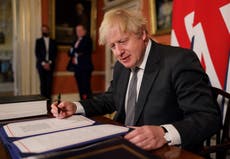Musicians have been betrayed by this Brexit deal – we need answers and we are not going away
Without visa-free tours of Europe, it will be economically impossible for many artists starting out – now we risk losing the next Adele or Ed Sheeran to red tape and bureacracy


Your support helps us to tell the story
From reproductive rights to climate change to Big Tech, The Independent is on the ground when the story is developing. Whether it's investigating the financials of Elon Musk's pro-Trump PAC or producing our latest documentary, 'The A Word', which shines a light on the American women fighting for reproductive rights, we know how important it is to parse out the facts from the messaging.
At such a critical moment in US history, we need reporters on the ground. Your donation allows us to keep sending journalists to speak to both sides of the story.
The Independent is trusted by Americans across the entire political spectrum. And unlike many other quality news outlets, we choose not to lock Americans out of our reporting and analysis with paywalls. We believe quality journalism should be available to everyone, paid for by those who can afford it.
Your support makes all the difference.It’s fair to say that confusion reigns supreme right now – on so many issues, across the entire planet. An unprecedented chain of events has changed almost everything.
As recently as early last year, the music industry was just getting on with its thing. Artists, bands and orchestras were performing, touring and recording, while casually adding £2.9bn to the UK economy in 2019, an impressive 9 per cent up on the previous year. The prospect of leaving the European Union was looming but there was talk of a deal and musicians are always flagged up as such an important part of our heritage, envied throughout the world. Surely the politicians negotiating the deal wouldn’t sell us out.
There is an idea that those involved in the arts are left leaning when it comes to politics, but MPs, cabinet members and even prime ministers have always seen the value in name-checking bands to make them seem more human – even if, when pushed, their favourite album often turns out to be “The Best Of…”
It was an uneasy peace, but the music industry played its part when it came to bringing in the cash and the coolness. As so many accountants have said: “That’s why it's called the music business.”
Then, at a stroke, the entire world was plunged into chaos and inactivity. Lockdowns were announced across the globe, with varying degrees of severity. But there was never any doubt that live music events would be the last part of the old world to be restored, in whatever form. Nearly a year on, it’s still unclear.
With the pandemic still curtailing our lives and shutting down the music industry, we also awkwardly slipped our moorings from the European Union on 31 December and headed out into unknown – and possibly disputed – waters. But our ship was captained by those who told us not to worry. Icebergs were not going to be an issue, whether the metaphorical threat to safety type or the actual lettuces. All would be good – particularly as we had been told time and again that leaving the EU would mean an end to “bureaucracy and red tape”.
Once the Brexit deal was signed and shared, everyone eagerly tried to find the sections and subsections that affected them. Previously, artists from the UK could tour in 27 other European countries under the same rules as at home. And when I say bands, I don’t just mean a gang of hedonistic loons living out their quirky fantasies. I mean the lighting and sound crews, the drivers, tour managers and merch sellers – the business part of the music business.
It won’t be so easy now we have left the club. In a story broken by this newspaper, it turns out that the UK rejected an offer of visa-free tours by musicians to EU countries. The story said: “A ‘standard’ proposal to exempt performers from the huge cost and bureaucracy for 90 days was turned down because the government is insisting on denying that to EU artists visiting this country.”
So what now? Well, according to the story: “From this month, they [UK musicians] must, like non-EU artists, apply for visas – to visit for more than 30 days – as well as providing proof of savings and a sponsorship certificate from an event organiser.”
Bigger artists putting on stadium shows will more than likely be able to survive, but anyone below that level will be hit hard. Primarily by, you guessed it, “bureaucracy and red tape”. There is no “fix all” bit of paperwork for the whole of Europe. It goes way beyond work permits, driving licences, health coverage and the most obvious stuff – every T-shirt and individual piece of merchandise has to be accounted for, for tax reasons. It's a lot of counting at every border crossing.
And then there's the dreaded “carnet”, a word that strikes fear into the heart of any tour manager long in the tooth enough to have worked with them before EU membership made them obsolete. A carnet is a passport for all the equipment a band would have, from a guitar pedal to a spotlight – just think about how many parts make up a drum kit to give you some idea of the scale of each and every border crossing.
So, yes, a deal had been done and exceptions had been made. An extensive list of those who could go to EU member states and work without need of a permit includes consultants, people attending conferences, technical, scientific and statistical researchers, market researchers, analysts. Anyone putting on a training seminar is exempt. It's quite a long list and I am genuinely happy for everyone included on there.
But short of setting up The Charlatans Business Consultancy Inc – where people buy tickets and I sing my “research” to them with a four-piece accompaniment – there didn't seem to be anything that ensured we wouldn't have huge amounts of that dreaded bureaucracy and red tape, as well as all the costs they bring.
Those costs mean that the precarious economics of touring Europe would make it impossible for so many artists starting out. Those artists that are lauded when they make it – those future Florences, Adeles and Eds – are having so many more obstacles put in front of them. It puts the music industry everyone is apparently so proud of under serious threat.
All our bands would have enjoyed the ability to travel and play in 27 countries, while offering bands from EU countries the chance to come and play in just one. I wrote on Twitter that we needed an explanation from the government and assume the 100,000+ likes show that others would like one, too. MPs agreed; music venues wanted to know; Louis Tomlinson added his voice.
The government's reaction? A spokesperson told NME that the story was incorrect and misleading. To borrow a phrase from Mandy Rice-Davies, they would say that, wouldn't they?
We need clarity. What exactly did they ask for? How come an agreement couldn't be made? We make noise for a living. We're not going to go quiet now.




Join our commenting forum
Join thought-provoking conversations, follow other Independent readers and see their replies
Comments